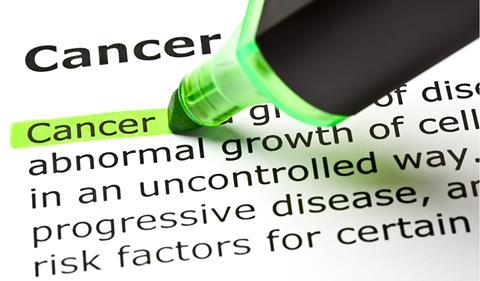Sasha Daly outlines the top priorities that the new government should pursue to improve the lives of young people with cancer across the UK

Cancer is the leading cause of death from disease in teenagers and young adults, with around 255 deaths in England annually. We know that early diagnosis and specialist care are important in improving patient experience and survival rates but unfortunately young people (aged 10-25) often have a less positive experience, and poorer access to healthcare services, than younger children or adults.
Teenage Cancer Trust’s specialist units, teams of expert nurses and youth support staff offer young people with cancer the very best care and support from the moment they are diagnosed. However, barriers in the current system mean that not all young people access the best care available.
In 2020, the government should resolve to focus on five core areas that will improve the experience of young people with cancer by addressing some of the challenges they currently face.
Workforce
Teenagers and young adults have distinct needs that differ from those of a child or adult. When young people are treated in age appropriate environment and by specially trained, age appropriate staff, their experience significantly improves.
In the current climate of extreme workforce pressures, it is more important than ever that we ensure there is sustainable funding for specialist NHS services, so that all young people living with cancer can access the support they need.
Teenage Cancer Trust wants to see a long-term teenage and young adult workforce strategy for all specialist posts.
Early diagnosis
It is a simple fact that early diagnosis of cancer can save lives. The NHS long-term plan places a particular emphasis on improving cancer diagnosis timelines in order to save more lives, however, it can be especially difficult for teenagers and young adults to get a timely diagnosis.
Young people often lack knowledge and awareness of cancer, so miss symptoms or are too scared to speak to a doctor about them. In addition, GPs may be less likely to suspect a young person’s symptoms could be cancer as the disease is rare among this age group.
A survey by Teenage Cancer Trust found that only 61 per cent of young people said they had access to a psychologist or counsellor throughout their treatment for cancer
A recent study found that 35 per cent of 13-24 year-olds with cancer who consulted with their GP had three or more consultations before being referred, compared to only 18-23 per cent of adults.
The government must ensure that GPs are equipped to spot the signs and symptoms of cancer in teenagers and young adults, enabling them to make efficient and confident referrals. The new initiative for Rapid Diagnostic Centres could be the breakthrough we’ve been waiting for, to investigate vague and persistent symptoms in young people, which could help detect cancers earlier.
Mental health
Young people say that mental health support is one of the most important services they can access when dealing with cancer, but we know there is huge pressure on the child and adolescent mental health services. This means some young people aren’t able to access the support they require.
Young people with cancer often experience difficulties, such as depression, anxiety, loneliness and body image worries, throughout their treatment and into recovery. A survey by Teenage Cancer Trust found that only 61 per cent of young people said they had access to a psychologist or counsellor throughout their treatment for cancer – this fell to 44 per cent after treatment had finished.
It is vital that every young person with cancer who requires mental health support has access to it. The Department of Health and Social Care must ensure that the right services are available for each teenager and young adult who is referred for expert psychological support during and after treatment as a routine part of their care.
Fertility
Chemotherapy, radiotherapy and surgery are commonly used in the treatment of cancer and can affect fertility. However, young people are telling us that they don’t get timely information about their fertility options and can face barriers to accessing fertility treatment.
Young people are telling us that they don’t get timely information about their fertility options and can face barriers to accessing fertility treatment
As a result, many young people have very negative experiences such as, not being given any information about their options – as was the case for 29 per cent of young people surveyed by Teenage Cancer Trust – or being given incorrect or limited information.
Every young person must have their fertility options discussed with them, regardless of whether their prognosis is expected to directly affect fertility. It is important that healthcare teams are trained to properly do so, allowing teenagers and young adults to make fully informed decisions and understand what is going on.
Clinical trials
Clinical trials can contribute to significant improvements in survival and patient experience, yet young people with cancer are not getting equal opportunity to participate in them.
They have significantly worse participation rates in clinical trials than children and older adults, meaning they do not have equal access to potentially more effective treatments and innovative therapies.
Work must be done to ensure that the barriers that currently prevent young people from accessing clinical trials are broken down.
This inequality exists in part due to the current lack of effective systems in place to ensure young people are referred to relevant trials, and in part due to a lack of available trials that young people could qualify for.
NHS England’s long-term plan, and the upcoming Service Specifications for Teenage and Young Adult Cancer Services has committed to increase participation in clinical trials by at least 10 per cent by March 2021, which if achieved, has the potential to be game changing.
Implementation of this commitment is now critical. We want to see this measurable change achieved in the year ahead and will do whatever we can to support it.
With the upcoming publication of the NHS England Service Specifications for Children, Teenage and Young Adult Cancer services, we want NHS England and the government to implement the plans set out, addressing all of the points raised in this piece and ensuring that not only experience, but the survival and recovery of young people with cancer improves in the UK.




























No comments yet